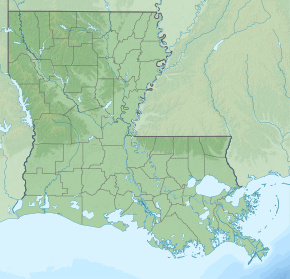| Actions near Alexandria | |||||||
|---|---|---|---|---|---|---|---|
| Part of the American Civil War | |||||||
 Union gunboats safely pass through Bailey's Dam at Alexandria, Louisiana. | |||||||
| |||||||
| Belligerents | |||||||
|
|
| ||||||
| Commanders and leaders | |||||||
|
Nathaniel P. Banks David Dixon Porter | Richard Taylor | ||||||
| Units involved | |||||||
| Department of the Gulf | Department of West Louisiana | ||||||
| Strength | |||||||
| 33,500 | 6,000 | ||||||
Location in Louisiana | |||||||
The Actions near Alexandria (April 24 – May 13, 1864)[1][2] saw a Confederate States Army force commanded by Major General Richard Taylor surround a greatly superior Union Army led by Major General Nathaniel P. Banks and a United States Navy flotilla commanded by Rear Admiral David Dixon Porter at Alexandria, Louisiana. Porter's gunboats were trapped above the double falls in the Red River by low water. Banks' army was compelled to halt its retreat to keep Porter's vessels from being scuttled or from falling into Confederate hands.
Meanwhile, Taylor positioned his scanty forces to blockade the Union forces within Alexandria. For several days, the Confederate force was able to block all traffic in the Red River. Porter's fleet was saved when an innovative Union engineer built Bailey's Dam which raised the water level enough to float Porter's gunboats over the falls and into deeper water. On May 13, Banks' army brushed aside Taylor's troops and marched downstream. Though Banks ordered Alexandria to be spared, Union soldiers burned down most of the city when they left.
- ^ Boatner 1959, p. 7.
- ^ Boatner's entry for Alexandria had the dates May 1–8. Boatner listed actions from Hudnot's Plantation on April 30 through Dunn's Bayou on May 5.

